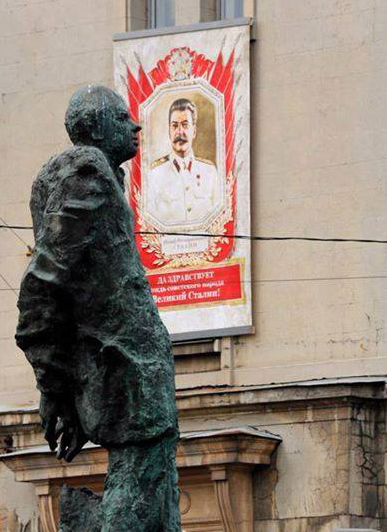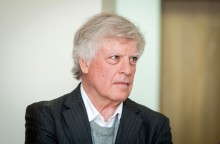David Satter, a US political writer and political scientist, a fellow at John Hopkins University and the Hudson Institute in Washington, has been doing research on the Soviet Union and post-Soviet Russia for four decades. A former correspondent of The Financial Times and The Wall Street Journal, he has written four thematic books on the collapse of the USSR and the post-communist history of the Russian Federation.
In 2013 Satter worked in Moscow as Radio Liberty correspondent. Three months after he had begun to work, the journalist was expelled from Russia, thus creating a precedent for US journalists after the Cold War. Seizing the opportunity, The Day asked the journalist about his vision of the situation in present-day Russia and the prospects of that state’s development.
Satter visited Kyiv’s Book Arsenal in 2017 to launch his books Age of Delirium: the Decline and Fall of the Soviet Union and The Less You Know, the Better You Sleep translated into Ukrainian and released by the Dukh i Litera publishers.
“LIBERALIZATION WAS AIMED AT PROJECTING A FALSE ‘CIVILIZED’ IMAGE”
Mr. Satter, why do you think you were denied entry into Russia at the end of 2013?
“As I see it, the Russian authorities began to be afraid of not so much the actions I had already taken as the ones I was going to take. The situation in Ukraine could also influence this decision. I think when the Euromaidan began, Russia revised all the liberalization measures they had allowed themselves to take before in order to project a false ‘civilized’ image among Western countries. When the Russian authorities saw what had happened on Kyiv streets, they decided that this level of freedom could be dangerous for them.”
Do you still pursue the subject of Russia?
“Yes, I chose to work outside Russia, but to work honestly and without any censorship. Some foreign journalists think: ‘I won’t write everything, but this will be a grain of truth.’ They don’t understand that this self-censorship will throw away the most important information and thus mislead the reader.

SAKHAROV SQUARE, SAINT PETERSBURG. THESE DAYS / Photo from Dmitry PILIKIN’s Facebook page
“I cannot speak of all the foreign correspondents in Russia, but, undoubtedly, many of them do not let themselves say the whole information. And it is psychologically dangerous because this erases the mental line of difference between the desire and the real.”
You have often written that, to be democratized, Russia should acknowledge its past mistakes and crimes of the communist regime. To what extent realistic is it to expect this from present-day Russia, and under what circumstances can this occur?
“Russia will manipulate its past as long as it is necessary to maintain a repressive regime. This state will be able to stop falsifying history when it is prepared to become democratic. In fact, readiness to tell the truth about its past will be one of the first signs of democratization.
“In a state, where the people decide their own destiny, these people should be well informed. And if we create a system that works on the basis of equality, it will be based on the facts everybody can accept. For mutual agreement can only be reached in the case of truth.”
“A SYSTEM BASED ON PROPAGANDA AND CORRUPTION WILL BE DEGRADING”
If democratic changes are possible, who will make them?
“There are a lot of conscientious people in Russia. They are in the minority, but they exist. These people are aware of what has happened in the country as a result of the state’s supremacy over man. At the same time, the Russians are not as isolated as they were in the Soviet era. Many of them travel and can see the way other people live.
“This segment of people begins to understand that tyranny in their state is hereditary and that the children, friends, and relatives of those in power today will continue to rule the country without any competition. This reduces opportunities for others and the overall level of society which cannot use its talents and rationally organize domestic processes. Therefore, the people who have seen the world and understand that they can live differently and, at the same time, are concerned about their future can form a real force to improve the situation.
“Besides, it is difficult to imagine that a system based on propaganda and corruption can live eternally. This kind of system will be degrading as time goes by.”
What do you think represents a graver danger – propaganda or the fear of opposing the regime?
“By all accounts, it’s propaganda. The problem is that the majority of Russia’s population does not feel they are under repressions. Oddly enough, they get used to these conditions in the course of time. Frederick Douglass, an Afro-American who was born in slavery and fought for the rights of America’s black population, said it was typical of a slave to take a totally distorted situation as a normal one and not to try to change it.”
You communicated with a lot of people in Russia and explored concrete human stories. What do you think about the psychological portrait of a present-day Russian?
“Naturally, people are different. But the main problem is that many Russians agree that the state can use people in its own interests. They see nothing wrong in this.”
What can stir up outspoken discontent in Russia?
“I think a worsened economic situation can be the background. And then something completely unexpected may happen – like the Euromaidan, when riot police beat up students. This may prompt people to protest because it will symbolize everything they don’t like in their society.”
And what about the Russian presidential elections scheduled for 2018?
“I don’t think the Putin regime is prepared to give up power. I wouldn’t expect these elections to be fair and free of violations.”
“A NARROW CIRCLE OF PEOPLE DECIDES EVERYTHING”
How may residents of Russia react to this?
“There is a certain fatalism embedded in their mentality. The Russians think they can’t do much and politics is like the weather. I remember that when I first came to Russia in October 1976, local elderly women said it would be the severest winter in the past 50 years. This worried me and I went to the senior correspondent. He answered: ‘They say so every year.’
“You should also keep in mind that Russia’s destiny has always been decided in the capitals. Even the fact that the country is very inert can ensure radical changes because a narrow circle of people decides everything.”
You once wrote that Russia badly needs a new moral foundation. What can serve as this foundation?
“There are also positive examples and heroes in Russian history. They are Decembrists, Soviet dissidents, etc. The problem is that these heroes never dominated in public awareness. Here’s a simple example: Germany lauds the people who plotted against Hitler in 1944. Naturally, those people were considered traitors in the Hitler era. Likewise, there were people in Russian history, who were trying to promote democracy and freedom.”







